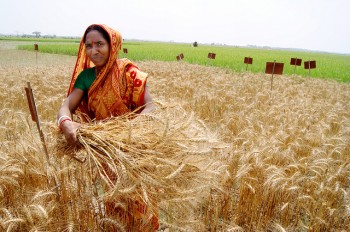United States Agency for International Development (USAID)
Reviewing progress and impacts of two core maize projects as they wind up work in sub-Saharan Africa
 Climate adaptation and mitigation
Climate adaptation and mitigation
CIMMYT empowers a new generation of maize breeders in Zambia
 Capacity development
Capacity development
CIMMYT conducted a training course in Zambia for maize breeders teaching modern maize breeding methods.
Yield gap analysis key to meeting future crop demand
 Nutrition, health and food security
Nutrition, health and food security
The Global Yield Gap Atlas (GYGA) can help identify where major crop yields are not increasing fast enough to meet demand on existing farmland, and how farmers might close those gaps.
Pakistani stakeholders evaluate the performance of CIMMYT maize germplasm across Punjab
 Capacity development
Capacity development
Pakistan Agricultural Research Council (PARC), organized a traveling seminar to give stakeholders the chance to evaluate the performance of CIMMYT maize germplasm in Punjab Province, Pakistan.
Rebuilding livelihoods: CIMMYT supports agricultural recovery in Nepal
 Climate adaptation and mitigation
Climate adaptation and mitigation
Replacing gender myths and assumptions with knowledge
 Gender equality, youth and social inclusion
Gender equality, youth and social inclusion
If we are to be truly successful in improving the lives of farmers and consumers in the developing world, we need to base our interventions on the best evidence available.
The first heat tolerant maize hybrids are licensed for deployment in Bangladesh, India and Nepal
 Climate adaptation and mitigation
Climate adaptation and mitigation
Seed improvement to prevent rust disease key to boosting wheat productivity
 Capacity development
Capacity development
A new project in Ethiopia aims to improve the livelihoods of wheat farmers by encouraging the development and multiplication of high-yielding, rust-resistant bread and durum wheat varieties.
AIP-CIMMYT holds national meeting on conservation agriculture in Pakistan
 Innovations
Innovations
“Cereal system productivity cannot be improved without improving agronomic practices,” declared Shahid Masood, Member of the Pakistan Agricultural Research Council (PARC) at a two-day AIP-Agronomy national meeting on conservation agriculture held in Islamabad, Pakistan, on 26-27 May 2015. He lauded CIMMYT’s efforts to strengthen conservation agriculture (CA) research and disseminate CA to Pakistan’s farming community and mentioned the importance of public and private partnerships for promoting CA technologies. The meeting was jointly organized by CIMMYT and PARC under USAID’s Agricultural Innovation Program (AIP) for Pakistan.
Strengthening seed production capacity in Malawi
 Capacity development
Capacity development
CIMMYT designed and gave an integrated maize seed systems training course for 32 seed technicians from the public and private sectors on 18-22 May at Chitedze Agricultural Research Station. The course is part of CIMMYT’s capacity building initiative to enhance maize seed production in Malawi, established after the successful launch of USAID Feed the Future’s Malawi Improved Seed Systems and Technologies project on 6 May 2015 in Liwonde, Machinga District.
